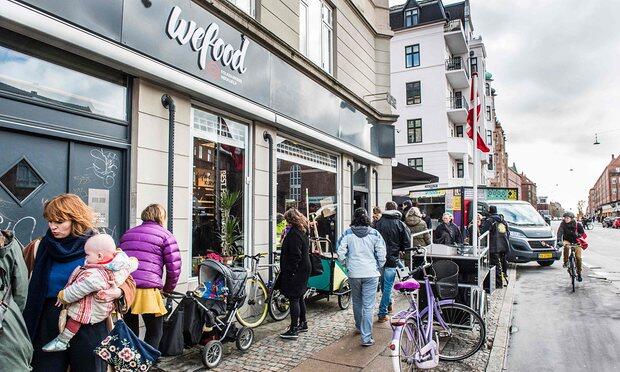It may be past its sell-by date, but for many Danes it’s a tasty proposition: surplus food being sold in a Copenhagen supermarket has proved so popular that a second store has been opened.
After launching in the district of Amager earlier this year, the Wefood project attracted a long queue as it opened a second branch in the trendy neighbourhood of Nørrebro, this month.
“It’s awesome that instead of throwing things out they are choosing to sell it for money. You support a good cause,” said Signe Skovgaard Sørensen, a student, after picking up a bottle of upscale olive oil for 20 kroner (£2.28).
“Isn’t it great?” pensioner Olga Fruerlund said, holding up a jar of sweets she planned to give to her grandchildren for Christmas. The sweets “can last for a hundred years because there is sugar in them,” she added.
Selling expired food is legal in Denmark as long as it is clearly advertised and there is no immediate danger to consuming it. “We look, we smell, we feel the product and see if it’s still consumable,” project leader Bassel Hmeidan said.
All products are donated by producers, import and export companies and local supermarkets, and are collected by Wefood’s staff, all of whom are volunteers. The store’s profit goes to charity.
Prices are about half of what they would be elsewhere, but even its biggest fans would struggle to do their weekly shop here. The products available depend on what is available from donors, resulting in an eclectic mix that changes from day to day.
One weekday afternoon, customers were greeted by a mountain of Disney and Star Wars-branded popcorn, while the fresh fruit section had been reduced to a handful of rotting apples.
Food waste has become a hot topic in recent years, with initiatives ranging from a French ban last year on destroying unsold food, to a global network of cafes serving dishes with ingredients destined for the scrapheap.
British-based The Real Junk Food Project opened the country’s first food waste supermarket in a warehouse near Leeds in September.
With a greater focus than its Danish peer on feeding the poor, the UK project urges customers to simply “pay as they feel”.
A UN panel said earlier this month that supermarkets’ preference for perfect-looking produce and the use of arbitrary “best before” labels caused massive food waste that, if reversed, could feed the world’s hungry.
Nearly 1.3bn tonnes of food are wasted every year, more than enough to sustain the 1 billion people suffering from hunger globally, the UN Food and Agriculture Organisation said.











